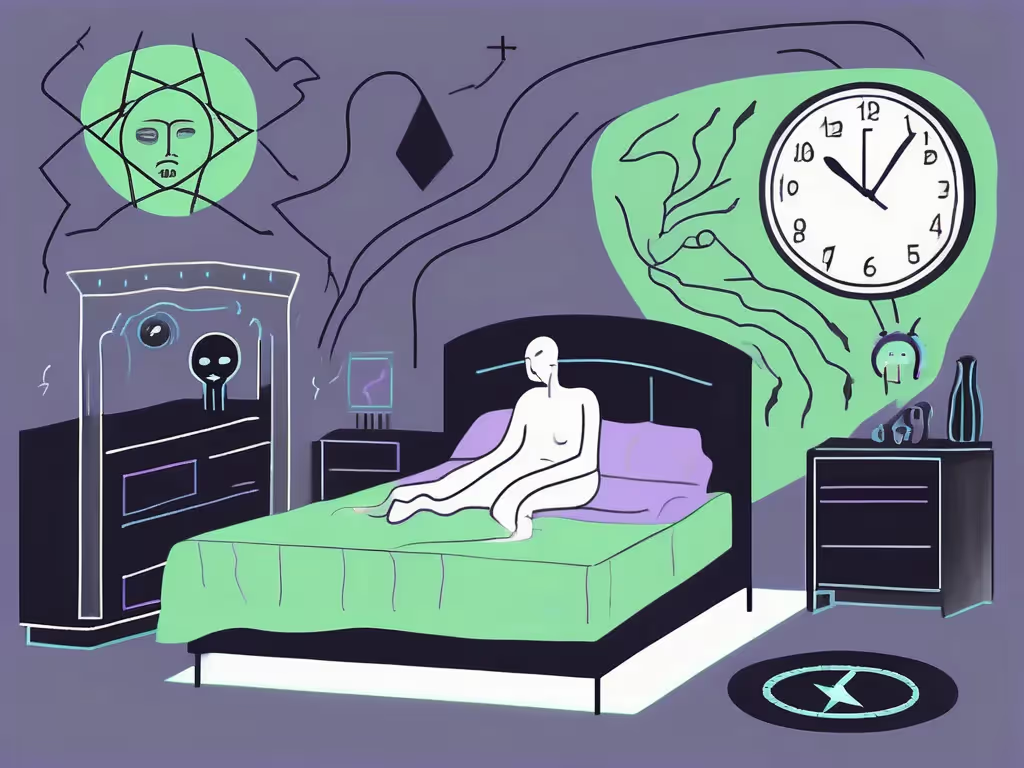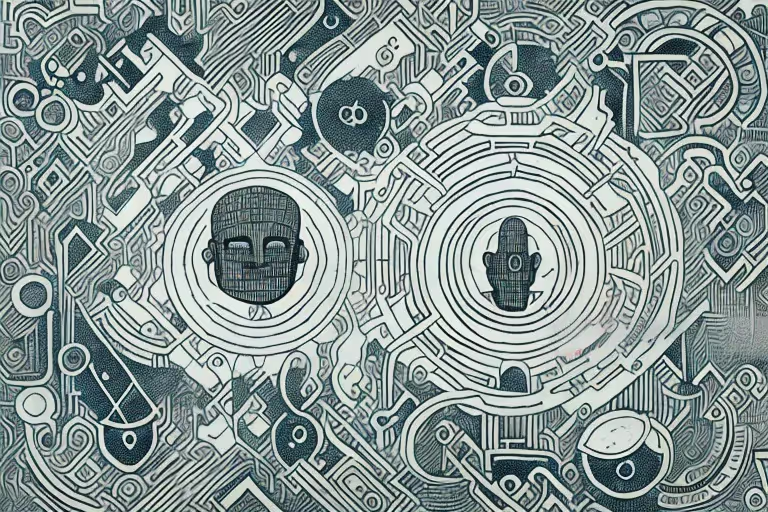Have you ever woken up in the middle of the night, unable to move or speak? Your mind alert, but your body paralyzed, as if held hostage by an unseen force. This perplexing phenomenon is known as sleep paralysis, a condition that has been the subject of fascination and fear for centuries. In this article, we will delve into the causes and understanding of sleep paralysis, shedding light on the mysteries behind this intriguing experience.
Understanding Sleep Paralysis
Before we explore the depths of sleep paralysis, let's take a closer look at what it actually is. Sleep paralysis occurs during the transition between wakefulness and sleep, when our bodies are temporarily immobilized to prevent us from acting out our dreams. However, sometimes this transition goes awry, leaving us trapped in a state of paralysis while our mind remains active and aware.
Sleep paralysis is a fascinating phenomenon that has intrigued scientists and researchers for centuries. It is a unique experience that can be both terrifying and perplexing. While some may dismiss it as a mere glitch in our sleep cycles, there is much more to it than meets the eye.
The Science Behind Sleep Paralysis
From a scientific standpoint, sleep paralysis is caused by the disruption of our normal sleep cycles. During the rapid eye movement (REM) stage of sleep, vivid dreams occur and our muscles are temporarily paralyzed to prevent us from physically acting out these dreams. This temporary paralysis is a safety mechanism designed to protect us from harm.
However, if we happen to wake up during this stage, the body remains in a paralyzed state, creating the sensation of being trapped. This can be a distressing experience, as we are fully conscious but unable to move or speak. It is important to note that sleep paralysis is a relatively common occurrence, with studies estimating that it affects around 8% of the population.
Scientists have identified several factors that can contribute to the occurrence of sleep paralysis. These include sleep deprivation, irregular sleep schedules, stress, anxiety, and certain sleep disorders such as narcolepsy. Understanding these underlying causes can help individuals better manage and prevent episodes of sleep paralysis.
Common Misconceptions About Sleep Paralysis
Sleep paralysis has long been associated with supernatural entities and malevolent demons lurking in the shadows. While these eerie hallucinations can accompany sleep paralysis, it is important to understand that they are mere products of our overactive imagination and not external forces. Recognizing these hallucinations for what they truly are can help alleviate some of the fear and anxiety that often accompany sleep paralysis.
It is worth noting that sleep paralysis is not a sign of mental illness or a spiritual encounter. It is a natural phenomenon that occurs within the realm of sleep and wakefulness. The hallucinations experienced during sleep paralysis are known as hypnagogic or hypnopompic hallucinations, which can take various forms such as shadowy figures, strange sounds, or a feeling of being watched.
While sleep paralysis can be a distressing experience, it is generally harmless and tends to resolve on its own. However, for individuals who experience frequent or severe episodes of sleep paralysis, seeking medical advice is recommended. A healthcare professional can provide further guidance and explore potential underlying causes or contributing factors.
Overall, sleep paralysis is a fascinating and complex phenomenon that continues to captivate the interest of scientists and researchers. By shedding light on its mechanisms and dispelling common misconceptions, we can gain a deeper understanding of this intriguing aspect of the human sleep experience.
The Phenomenon of Sleep Paralysis Demons
Although the existence of sleep paralysis demons is purely psychological, their impact on individuals is very much real. Let's explore the historical and cultural perspectives surrounding these otherworldly beings, as well as the psychological interpretations that shed light on why they manifest in the minds of those experiencing sleep paralysis.
Historical and Cultural Perspectives
Sleep paralysis, along with its accompanying demonic entities, has been deeply ingrained in various cultures throughout history. From ancient folklore to contemporary urban legends, the belief in these supernatural beings is widespread. It is through exploring these different cultural lenses that we gain insights into the universality of such experiences.
Psychological Interpretations
On the other hand, psychologists offer a different perspective when it comes to sleep paralysis demons. They suggest that these hallucinatory creatures are manifestations of our deepest fears and anxieties. During sleep paralysis, the mind is in a heightened state of vulnerability, and our subconscious fears can take on tangible forms in the shadowy corners of our perception.
Causes of Sleep Paralysis
Now that we have explored the phenomenon of sleep paralysis and its sinister companions, let's turn our attention to the factors that contribute to its occurrence. Understanding the causes can help demystify this perplexing experience.
Sleep Disorders and Their Connection to Sleep Paralysis
Individuals who suffer from sleep disorders such as narcolepsy or insomnia are more prone to experiencing sleep paralysis. These disorders disrupt the normal sleep patterns, increasing the likelihood of sleep paralysis episodes. By addressing and treating the underlying sleep disorder, the frequency and severity of sleep paralysis can be reduced.
Lifestyle Factors Influencing Sleep Paralysis
Aside from sleep disorders, lifestyle factors also play a role in the occurrence of sleep paralysis. Stress, sleep deprivation, irregular sleep patterns, and excessive alcohol consumption are known to increase the likelihood of experiencing sleep paralysis. Incorporating healthy sleep habits, managing stress, and maintaining a balanced lifestyle can contribute to a better sleep environment and potentially reduce the occurrence of sleep paralysis.
Coping with Sleep Paralysis
Living with sleep paralysis can be a challenging experience, but there are coping mechanisms that can help individuals navigate this nocturnal ordeal. Let's explore the medical treatments and interventions, as well as the self-help strategies that can empower and provide relief to those affected by sleep paralysis.
Medical Treatments and Interventions
In severe cases, medical interventions may be required to alleviate the symptoms of sleep paralysis. These can include prescription medications to regulate sleep patterns and muscle relaxants to prevent the body from going into a paralyzed state. Seeking professional medical advice can provide guidance on the best course of treatment for each individual.
Self-Help Strategies for Sleep Paralysis
For those seeking self-help strategies, there are various techniques that can be employed to manage and reduce the frequency of sleep paralysis episodes. Maintaining a consistent sleep schedule, creating a relaxing bedtime routine, and implementing stress-reduction techniques such as meditation or deep breathing exercises can significantly improve sleep quality and potentially reduce the occurrence of sleep paralysis.
The Impact of Sleep Paralysis on Mental Health
While sleep paralysis may be a transient and harmless experience for some individuals, it can have a significant impact on mental health for others. Let's explore the relationship between sleep paralysis, anxiety, and depression, and how these conditions can both be influenced by and influence the occurrence of sleep paralysis.
Anxiety and Sleep Paralysis
Anxiety disorders often go hand in hand with sleep paralysis. The fear and distress caused by these episodes can trigger anxiety, making it harder to relax and fall asleep, thus increasing the likelihood of sleep paralysis. By addressing and managing anxiety, individuals may be able to break the cycle and reduce the occurrence of sleep paralysis.
Sleep Paralysis and Depression
Conversely, sleep paralysis can also be a symptom of underlying depression. The disrupted sleep patterns and the distress caused by sleep paralysis episodes can contribute to the development or exacerbation of depressive symptoms. By seeking professional help and addressing the root causes of depression, individuals may find relief from both the emotional burden of depression and the occurrence of sleep paralysis.
Unveiling the causes and understanding the intricacies of sleep paralysis takes us one step closer to demystifying this enigmatic phenomenon. Whether it is through exploring the psychological interpretations of sleep paralysis demons or understanding the impact on mental health, shedding light on this subject brings comfort and understanding for those who have gone through these experiences. If you're curious to learn more about sleep, dreams, and how to enhance your well-being, consider exploring the Aura Health App, where you can find a wealth of information and tools to support your journey.
Aura is Your All In One App for Meditation, Mindfulness Wellbeing
Find peace every day with one app for your whole well-being. There is no one-size-fits-all solution to mental well-being. Aura is the first all-in-one wellness app that learns how to best help you. Discover an endless library of expert-created tracks for your well-being, all taught by the world’s best coaches, therapists, and storytellers. With Aura's personalized recommendations, you can find peace every morning, day and night.



.webp)






.avif)

%20(1).avif)


.avif)
.avif)
.webp)


.avif)


















































































































.avif)

















.svg)









